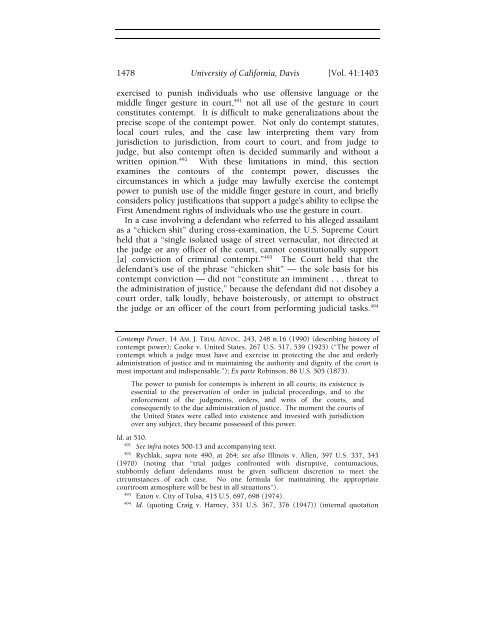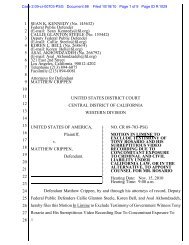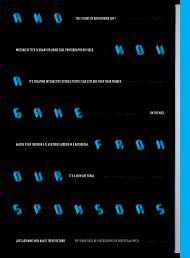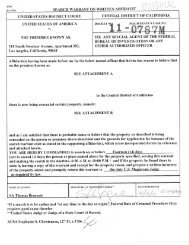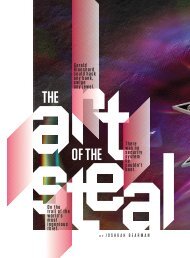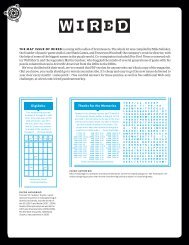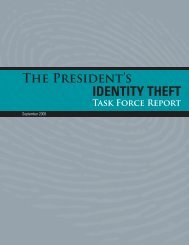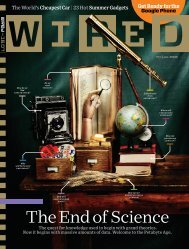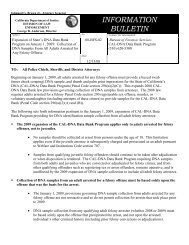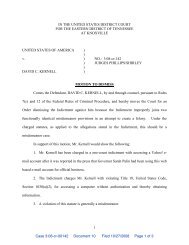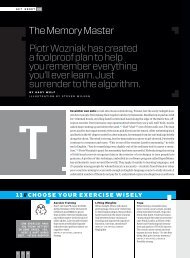Digitus Impudicus: The Middle Finger and the Law - Wired
Digitus Impudicus: The Middle Finger and the Law - Wired
Digitus Impudicus: The Middle Finger and the Law - Wired
You also want an ePaper? Increase the reach of your titles
YUMPU automatically turns print PDFs into web optimized ePapers that Google loves.
1478 University of California, Davis [Vol. 41:1403<br />
exercised to punish individuals who use offensive language or <strong>the</strong><br />
middle finger gesture in court, 491 not all use of <strong>the</strong> gesture in court<br />
constitutes contempt. It is difficult to make generalizations about <strong>the</strong><br />
precise scope of <strong>the</strong> contempt power. Not only do contempt statutes,<br />
local court rules, <strong>and</strong> <strong>the</strong> case law interpreting <strong>the</strong>m vary from<br />
jurisdiction to jurisdiction, from court to court, <strong>and</strong> from judge to<br />
judge, but also contempt often is decided summarily <strong>and</strong> without a<br />
written opinion. 492 With <strong>the</strong>se limitations in mind, this section<br />
examines <strong>the</strong> contours of <strong>the</strong> contempt power, discusses <strong>the</strong><br />
circumstances in which a judge may lawfully exercise <strong>the</strong> contempt<br />
power to punish use of <strong>the</strong> middle finger gesture in court, <strong>and</strong> briefly<br />
considers policy justifications that support a judge’s ability to eclipse <strong>the</strong><br />
First Amendment rights of individuals who use <strong>the</strong> gesture in court.<br />
In a case involving a defendant who referred to his alleged assailant<br />
as a “chicken shit” during cross-examination, <strong>the</strong> U.S. Supreme Court<br />
held that a “single isolated usage of street vernacular, not directed at<br />
<strong>the</strong> judge or any officer of <strong>the</strong> court, cannot constitutionally support<br />
[a] conviction of criminal contempt.” 493 <strong>The</strong> Court held that <strong>the</strong><br />
defendant’s use of <strong>the</strong> phrase “chicken shit” — <strong>the</strong> sole basis for his<br />
contempt conviction — did not “constitute an imminent . . . threat to<br />
<strong>the</strong> administration of justice,” because <strong>the</strong> defendant did not disobey a<br />
court order, talk loudly, behave boisterously, or attempt to obstruct<br />
<strong>the</strong> judge or an officer of <strong>the</strong> court from performing judicial tasks. 494<br />
Contempt Power, 14 AM. J. TRIAL ADVOC. 243, 248 n.16 (1990) (describing history of<br />
contempt power); Cooke v. United States, 267 U.S. 517, 539 (1925) (“<strong>The</strong> power of<br />
contempt which a judge must have <strong>and</strong> exercise in protecting <strong>the</strong> due <strong>and</strong> orderly<br />
administration of justice <strong>and</strong> in maintaining <strong>the</strong> authority <strong>and</strong> dignity of <strong>the</strong> court is<br />
most important <strong>and</strong> indispensable.”); Ex parte Robinson, 86 U.S. 505 (1873).<br />
<strong>The</strong> power to punish for contempts is inherent in all courts; its existence is<br />
essential to <strong>the</strong> preservation of order in judicial proceedings, <strong>and</strong> to <strong>the</strong><br />
enforcement of <strong>the</strong> judgments, orders, <strong>and</strong> writs of <strong>the</strong> courts, <strong>and</strong><br />
consequently to <strong>the</strong> due administration of justice. <strong>The</strong> moment <strong>the</strong> courts of<br />
<strong>the</strong> United States were called into existence <strong>and</strong> invested with jurisdiction<br />
over any subject, <strong>the</strong>y became possessed of this power.<br />
Id. at 510.<br />
491 See infra notes 500-13 <strong>and</strong> accompanying text.<br />
492 Rychlak, supra note 490, at 264; see also Illinois v. Allen, 397 U.S. 337, 343<br />
(1970) (noting that “trial judges confronted with disruptive, contumacious,<br />
stubbornly defiant defendants must be given sufficient discretion to meet <strong>the</strong><br />
circumstances of each case. No one formula for maintaining <strong>the</strong> appropriate<br />
courtroom atmosphere will be best in all situations”).<br />
493 Eaton v. City of Tulsa, 415 U.S. 697, 698 (1974).<br />
494 Id. (quoting Craig v. Harney, 331 U.S. 367, 376 (1947)) (internal quotation


